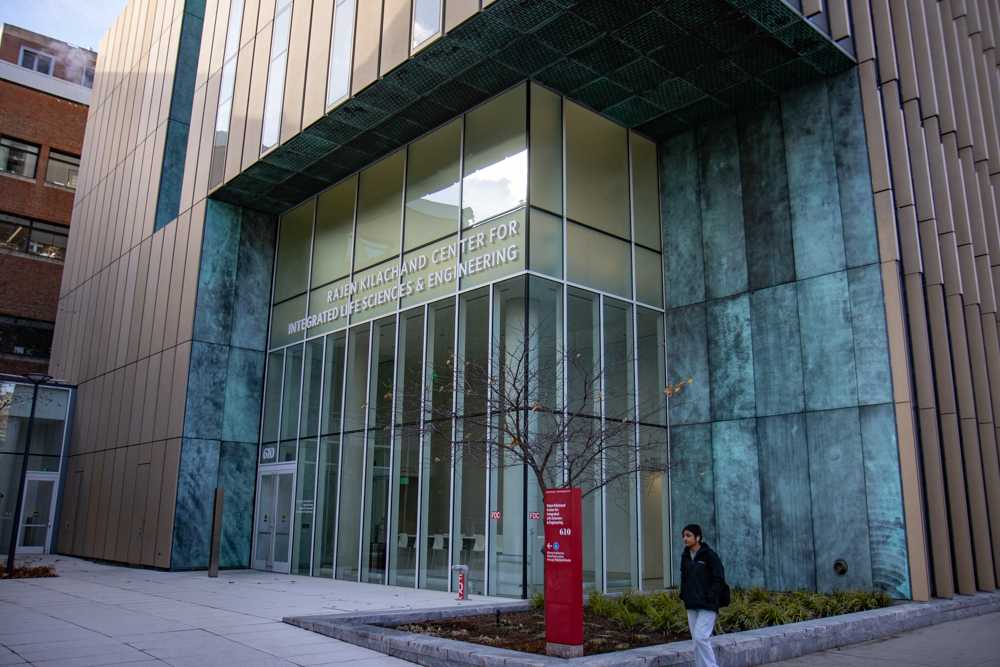Boston University’s science doctorate programs have improved steadily over the past 15 years, according to a recent study performed by the National Research Council.
The redesigned report aimed to assess programs based on effectiveness rather than ranking themalongside other universities, the National Research Council website said. The result is like a personalized progress report that highlightsareas within programs that need more improvement, the website said.
The data, collected in 2006, shows a technique of assessment that relies on surveys given to faculty and administrators, allowing them to rank the importance of each characteristic within a program, the website said. These qualities place a lot of importance on diversity and support, both for students and faculty.
Instead of basing their choices on a school’s prestige, students can find the school that best fits their own interests, the website said.
ONE ON ONE
Beyond the numerical values, many members of the BU scientific community consider the relationship between the students and faculty to be the reason for its improvement.
“Everyone was really helpful,” said Logan Chieffo, who graduated with a Ph.D. in chemistry from BU in 2002 and works as a research scientist in the BU physics department.
“I got all the guidance I could possibly need,” he said. “I worked with my faculty advisor doing chemistry, but other people in the department, if I ever needed anything like paper work or advice or just to chat, were really helpful.”
“Your grad school stay depends on how well you get along with your advisor,” he said. “If you get along with them, then you’re set.”
According to Robert Kaufmann, a professor in the College of Arts and Sciences and chair of geography and environment, “The research we do is pretty much done together as if the student was another scientist at another university.”
Kaufmann said that compared to the doctorate program he attended at the University of Pennsylvania, BU programs give students a lower student-to-faculty ratio.
“Here I have a much closer relationship to my Ph.D. students than I did with my faculty advisor at Penn,” he said.
Because of these close student faculty relationships, BU professors are able to keep in touch with students, helping them find jobs and research opportunities following the completion of their degrees, he said.
Many faculty members find fellowships outside the school, such as those offered by NASA, and the money from these also helps to support students, Kaufmann said.
“You can’t do good research with your Ph.D. students if you don’t support them,” Kaufmann said.
“Through contacts I made at BU I got job offers,” Chieffo said. “My foot in the door was having those recommendations.”
ONE BU
Students are also able to share their scientific research in an open environment, according to Geography and Environment Graduate Program Coordinator Christopher DeVits.
“BU’s program is small enough that it’s communal,” he said. “The students do get to know each other really well.”
“We have a lot of student programming, like seminars and lectures,” he said. “Each graduate student would give a seminar in front of the entire department on their own research. It keeps the department apprised on what other students and faculty are doing.”
Both faculty and staff said they feel incredibly supported, both in funds and options.
Chieffo said he came to BU to work on a new project with completely new equipment and faced multiple roadblocks, but he always received much encouragement.
“My project ended up having a lot of snags and it took me eight years to finish, but I never had to worry about support,” he said.
When choosing a graduate school, he said the ability to work with new equipment requested through a grant influenced his decision to attend BU.
“I was excited to do a project that no one else was offering,” he said. “I wanted a project that I was excited about, and someone that I knew I could get along with.”
Recruiting international students is also one of BU’s strengths, according to the diversity factor of the NRC’s assessment.
Boston University teams up with Beijing Normal University to allow international students to complete their doctorate, or even get a second doctorate, here in Boston, DeVitz said.
“A good number of my classmates were from China,” Chieffo said. “You see students from all over.”
INTERDISCIPLINARY ASSOCIATIONS
Diversity also exists within BU classes themselves, since students can take courses outside their department, DeVitz said. In fact, geography and environment students are required to take one course outside their area of study, he said.
Students are also admitted from a variety of undergraduate programs, some that one might not expect, he said.
“We just admitted a student from the astronomy program into our remote-sensing program,” he said. “We do a lot of work with International Relations. A lot of [their] faculty end up teaching our graduate students, cross listed with courses in our department.”
Chieffo said he attributes his position at BU to the openness between departments.
“I got a job in a physics department at BU mostly because there aren’t strong boundaries,” he said.
“The department has become a lot more interdisciplinary, focused a lot on real world problems,” Kaufmann said.
He said that from studying as an undergraduate at Cornell, he now sees how closed off a program can become to real world situations.
“As an undergraduate I studied at Cornell in ecology and systematics, which was all about how ecosystems function without any human disturbance,” he said. “That now constitutes a smaller and smaller portion of our world, and so to us, and many of us in this department, that’s a less and less important part of our program.”
He said the BU department focuses on “what we think are going to be important problems for society [and] what we think is important for students to know to keep up with the ever-changing world.”
An interdisciplinary quality is something that isn’t just unique to environment and geography, according to Chieffo.
He said that working in the photonics center allowed him to communicate with people from a variety of different fields.
“I worked shoulder to shoulder with physicists, electrical engineers, chemical engineers,” he said. “There are fewer chemists in the photonics center than any other discipline, and I never felt like I could only talk to chemists.”
Although there is a lot of communication between the sciences, there are discernable boundaries between the humanities and sciences, Chieffo said.
“I don’t think I met more than one humanities graduate student,” he said. “I think it would be cool to meet someone outside of the sciences.”
TRICKLE-DOWN EFFECT
The importance of strong doctorate programs goes beyond graduate study &- it affects the entire school, Kaufmann said.
“The gains in the Ph.D. program certainly filter down into the undergrads,” he said. “One of my constant snide remarks is oftentimes, the undergraduates that we send out to other PhD programs are better trained than the students we get back.”
Chieffo said he thinks the focus at BU remains on community, i.e. maintaining diversity and student-faculty relationships, he said.
“I feel like they’re making more and more of a push to build the community of chemistry even tighter,” he said. “There is a push to build these stronger communities.”
“The strive to be one BU starts with making the lines between departments less restrictive,” DeVits said.























































































































